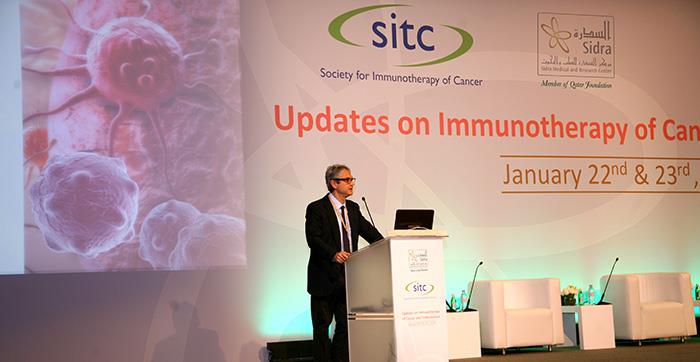Sidra Medicine and the Society for the Immunotherapy of Cancer (SITC) hosts the “Updates on Immunotherapy of Cancer and Immunoscore” event this week, with the leading authorities in oncology and immunotherapy traveling to Doha to share the latest research on novel cancer treatments, which use the body’s own protective response.
Immunotherapy uses the immune system’s T-cells to find and kill cancerous cells while avoiding the damage to healthy tissue commonly caused by many of the current forms of treatment, such as radiation therapy, chemotherapy and surgery.
“Our immune system is elegantly structured to recognize self from non-self, vigorously attacking cells deemed foreign. The goal of cancer immunotherapy is to understand these mechanisms and to promote anti-tumor immune responses. I am honored that the world’s top minds in immunotherapy research and practice are taking part in this meeting, which will spur international collaborations and further this breakthrough research. Genetics and disease risk assessment will be one of the Centers of Excellence at Sidra Medicine and we look forward to continuing our relationship with SITC and other international institutions in the immunotherapy arena to bring personalized treatments to patients,” said Sidra Medicine’s Chief Research Officer and SITC President, Dr. Francesco Marincola.
Over the course of the two-day program, world-wide leaders and visionaries in the field of cancer immunotherapy are discussing ways to improve the outcome for patients with cancer by incorporating strategies based on cancer immunotherapy.
Speakers are debating the latest research advances, focusing on currently approved and emerging tumor immunotherapy approaches, as well as the latest country updates on the initiative Immunoscore, which is an effort to change international practice around cancer prognosis for patients. The Immunoscore initiative advocates incorporating immune scoring as a prognostic factor and introducing this parameter as a marker to classify cancers as part of the routine diagnostic and prognostic assessment of tumors. As such, SITC, with the help of lead investigator Jérôme Galon, PhD from INSERM’s Cordeliers Research Center in France, initiated a worldwide task force to validate this practice.
Country delegations from France, Germany, Switzerland, Japan and the U.S. are presenting their findings from replicating the Immunoscore test in their countries, leading INSERM’s Dr. Galon to conclude, “This is the first worldwide effort to introduce a standardized immune test into cancer classification. This is a novel paradigm for cancer with major implication for immunotherapy.”
“This novel approach for cancer treatment has far-reaching implications, including for the way cancer is treated in the region,” said Sidra Medicine’s Dr. Marincola. This is especially important for Qatar where the burden of cancer is high and is accountable for 10% of all deaths. “Sidra Medicine is dedicated to furthering research that will help bring novel treatments for devastating diseases like cancer to patients across the globe.”


